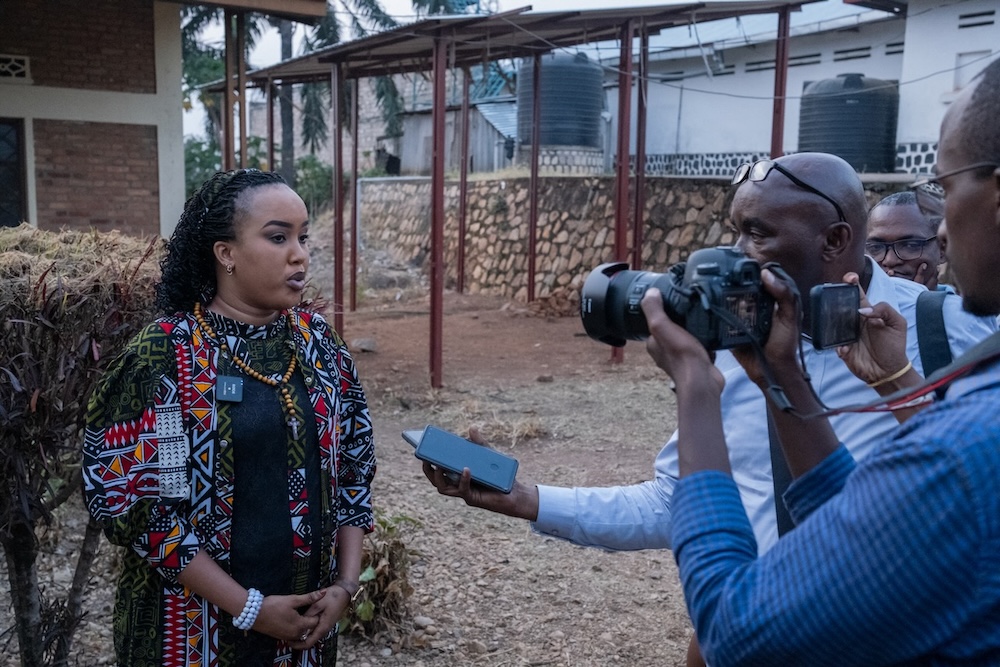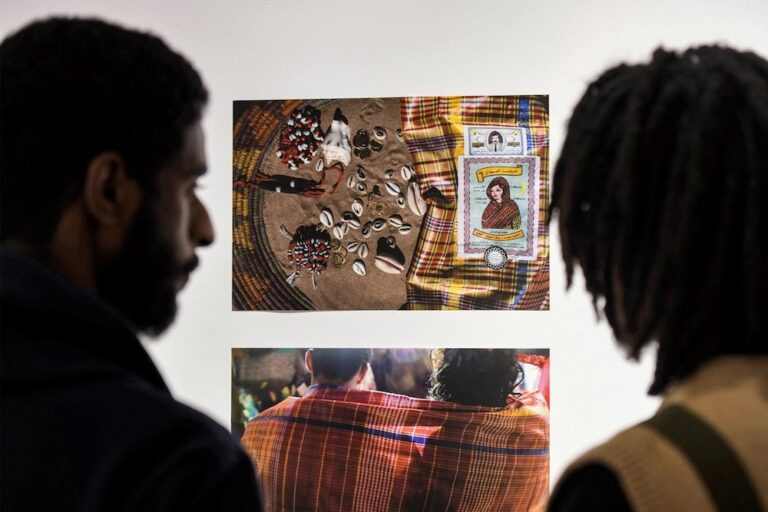Reyhana Masters and Laura Vidal examine how this global scourge is impacting the Africa and Latin America/Caribbean regions, the specific threat landscape for women journalists, and how those forced to flee can be better supported.
The forced displacement of journalists and rights defenders has become a global phenomenon. In this brief, the authors look into some of the root causes and impacts in Africa and Latin America and the Caribbean. In part two, they share some support initiatives and reflect on the potential for greater cross-regional collaboration.
In Latin America and the Caribbean, the erosion of democratic protections and the rise of authoritarianism in countries like Nicaragua, Venezuela, Cuba, Haiti, El Salvador, and Guatemala have driven many journalists, and sometimes complete media outlets, into exile. Transnational organised crime also presents a significant threat, particularly in countries like Ecuador, Colombia, and Mexico, where criminal networks are often intertwined with corrupt politicians. In the Caribbean, state violence and organised crime in Cuba and Haiti have led to an increase in the number of journalists forced to flee their homes.
Similarly, West Africa has experienced a surge in military coups since 2020, severely undermining freedom of expression and media autonomy. Journalists who report on political instability, governance issues, and corruption face growing threats from military juntas in power. Countries like Niger, Mali, and Burkina Faso have distanced themselves from ECOWAS – in similar ways to how Nicaragua, Cuba, and Venezuela have distanced themselves from OAS and other neighbouring states, as well as the European Union – and formed the Alliance of Sahel States. This has further shifted regional dynamics, and the foreign policy shift has emboldened governments to expel foreign journalists, suspend independent media, and target local reporters.
As Irene Khan, UN Special Rapporteur on the promotion and protection of the right to freedom of opinion and expression, points out in her report on Journalists In Exile:
“Exiled journalists are a reminder, on the one hand, of the relentless onslaught on human rights in parts of the world and, on the other, of the human cost of violence and repression.”
In both Latin America and Africa, journalists exposing corruption, political mismanagement, or public resource exploitation are increasingly under threat. Their work in the digital world has also encountered significant challenges, in particular with respect to digital security and internet shutdowns during crisis, which has become an insidious threat to democracy.
Digital Security Lab detected traces of spyware on the phones of journalist Loïc Lawson, the publisher of Flambeau des Démocrates, an independent weekly in Togo, and freelance journalist Anani Sossou, in 2023. Togolese journalist Isidore Kowonou, who escaped to a neighbouring country by “crossing rivers and forests”, describes this deep-seated fear of the reach of his government.
“Ah, it’s very difficult. My mother cries every time I call her. I would have preferred to be somewhere else, because knowing this Togolese regime, it can reach me if I stay on the African continent. Many other compatriots have already been victims of this.”
In a number of countries in both regions, electoral integrity is compromised, internal conflict rages, or militant insurgencies shake stability. In this context, the role of investigative journalism is continually undermined by those in power (regardless of their ideological positions). Their discourse spreads on social media and in the field, leading to an erosion of public trust and diminishing support for journalists’ work and safety.
The aim of forcing journalists out is to create an information vacuum by ensuring the media and their sources are subdued into silence. As Kowonou explains: “… our departure [referring to his colleague Ferdinand Ayité] created a void. People tell us on social networks that they no longer have any true information since we left.”
Continuing to report from exile is not straightforward. He goes on to say:
“From here, you have to ask people, especially the team who stayed behind, to dig around to go and get the information. They too must be careful. Some of our sources on the ground become reluctant to give information, because they are afraid that the authorities will find out that they are giving us information.”
Exile does not guarantee safety
For journalists from both Africa and Latin America, exile often fails to provide the safety they seek. In addition to the trauma of displacement and family separation, they face the challenge of being disconnected from their information networks and audiences. The lack of sustained infrastructural and financial support in the countries they flee to makes their situation even more precarious.
This is particularly evident for those seeking refuge in Western Europe, the United States, or Canada, where continuing their work as journalists may feel out of reach. Moreover, an increasing anti-immigration rhetoric and restrictive policies in these regions further complicate the realities of migration.
In many instances, journalists flee first to neighbouring countries where threats to their safety persist. Many Burundian journalists who had initially sought refuge in Rwanda were later forced to relocate to Europe or the United States as the civic space in their first host country became increasingly restricted.
However, no matter where they go, journalists remain at risk simply for continuing their work. A striking example from this year is that of Burundian radio host Florianne Irangabiye, who was sentenced to ten years in prison in her home country for her critical broadcasts aired from Rwanda.
Harassment and violence frequently cross borders. The rise of transnational repression allows governments to continue persecuting their critics abroad. Rather than finding safety, many exiled journalists remain in constant fear, living as though they are still on the run. They must stay vigilant against surveillance and the ongoing risks to their safety, particularly those from countries with a history of transnational repression, such as Sudan, Ethiopia, Rwanda, and more recently, the West African Sahel states.
Rwandan journalist Kwizero Kalisa (a pseudonym) was compelled to flee to Kenya after learning of a plot to abduct him. The hunt for him was directly connected to his reports on the government’s forced suppression of the Rwandan and Ugandan backed M23 rebel army soldiers’ deaths in the Democratic Republic of Congo. Kalisa realised that no neighbouring country could be considered safe, as his family faced relentless questioning about his location, even after he fled.
Kalisa’s decision to leave Kenya and seek refuge in Europe was influenced by the fate of other journalists who had fled Rwanda only to be murdered or forcibly disappeared in neighbouring countries. “I can mention in Uganda, Charles Ingabire, editor-in-chief of the online publication Inyenyeri News and a vocal critic of the Rwandan government, who was shot twice in the chest as he returned home in the Bukesa-Kikoni Makerere district of Kampala,” recalls Kalisa.
“In Mozambique, a Rwandan journalist, Ntamuhanga Cassien, who had fled the country following death threats because of his broadcasts [on the national unity and reconciliation process in Rwanda], disappeared in Mozambique after being abducted by eight people claiming to be Mozambican policemen, accompanied by a man supposed to be a Rwandan official in the embassy in Maputo. Human rights organisations are still trying to find him, but to no avail.”
The persecution of Cuban journalists serves as another example of how repression follows those in exile. José Jasán Nieves Cárdenas, a Cuban editor living in Miami, received a WhatsApp message from an unknown number. The message warned, “We’ve tried to reach you every which way, but you’ve rejected us. Now we will have to come to you personally, and we know exactly where to find you.” It was accompanied by a video showing the exterior of his home. Similarly, Cuban journalists exiled in Spain have reported ongoing harassment by operatives believed to be linked to the Cuban government.
Additionally, the misuse of cybercrime laws has intensified. These laws are increasingly being weaponized to launch protracted legal battles against journalists, leading to detention, prison sentences, or torture.
In Africa, national-level cybercrime laws have already been used for this purpose, and now there is growing concern that this could become a global trend. According to Alexa Zamora, a Nicaraguan human rights defender, the UN’s Cybercrime Treaty lacks sufficient safeguards against abuse, raising fears of its potential to further enable repression:
“The situation of journalists working anonymously, both abroad and in the field, is deeply concerning. With this new international framework, there will be no safe haven for them anywhere.”
Governments like those of Venezuela and Nicaragua have resorted to extreme measures to continue their reach and control, such as revoking passports or stripping citizenship. These tactics not only limit access to basic rights, they increase the risks journalists face at borders. Families of journalists forced into exile by these countries are also targeted.
The threat landscape for women journalists
Investigative journalism, a field already fraught with risks, poses unique threats to women, who on top of violence from various adversaries frequently face workplace discrimination, limited leadership opportunities, and economic challenges.
In Ecuador, a comprehensive study on working conditions for women journalists – which could be extrapolated to the rest of the region and beyond – found that these pressures, compounded by gender-based violence and societal norms, often push them into exile.
As these underlying conditions are so extensive, gender-based challenges often persist and follow them across borders. Threats of sexual violence, harassment, and personal attacks target them more intensely, especially when they report on sensitive topics traditionally dominated by men, such as politics and security.
This is vividly illustrated by the case of former Lesotho Times journalist Keiso Mohloboli, who recounts the challenges of reporting on the army’s transgressions in Hounded: African Journalists in Exile. Her experiences ultimately forced her to leave the country when threats from the security sector intensified.
It started with disparaging and dismissive remarks from the spokesperson for the Lesotho Defense Force at the time, calling her a “half-cooked journalist” and officers harassing her “every time I would seek information”. As time went on, the situation deteriorated further, escalating to threats, arbitrary detention, forced apologies, and a legal battle, ultimately culminating in a violent attack on Lesotho Times editor Lloyd Mutungamiri.
“My ordeal did not end just because I was no longer in Lesotho. In June 2017, I received death threats after I published a post on my Facebook personal timeline. A Facebook account user operating under the name Lawrence Kori commented on the post, threatening me and telling me that I was getting close to my grave, that I would die soon.”
Kelso Mohloboli
UNESCO’s latest survey reveals that 73% of women journalists have faced online violence for their work, a figure Dagmar Flores, Protection Coordinator at Fundamedios, corroborates as rising, with many reports detailing digital attacks – which tend to also have physical implications.
Reporters Without Borders (RSF) has reported on numerous cases of Mexican women journalists who had to abandon their hometowns in the face of violent threats to them, and to their families.
More so than in the case of their male colleagues, women journalists are not only compelled to consider their children’s safety, they are often expected to carry that responsibility with them into exile. The threat landscape often makes it necessary to flee with their children.
Click here to read part two: Exiled Expression: Support Initiatives



